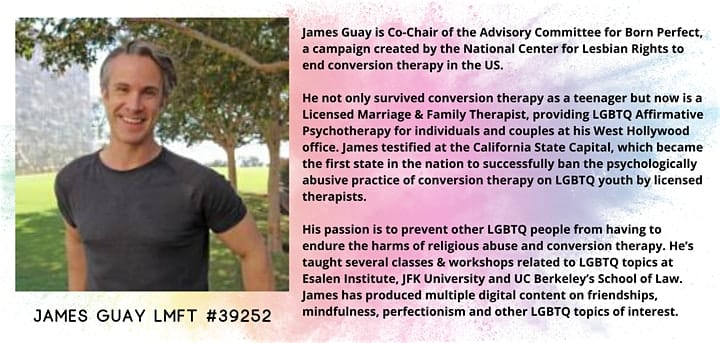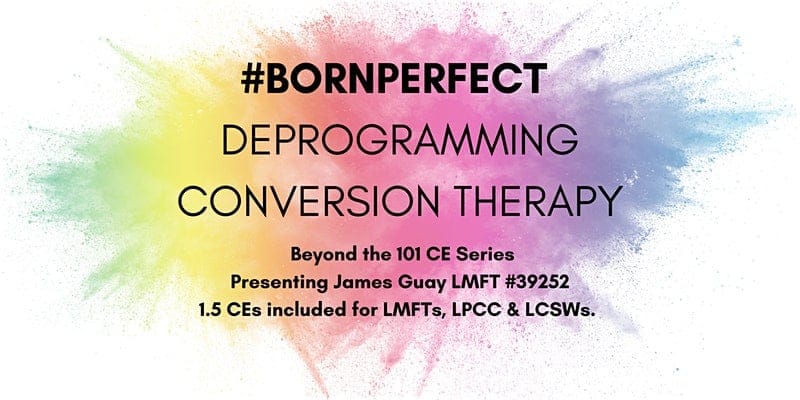James Guay LMFT & Born Perfect Campaign
Please join us at our Mental Health & Wellness Center in West Los Angeles.
1.5 CE’s included for LMFTs, LPCC and LCSWs.
Objectives:
- Identify three common strategies used in conversion therapy
- Describe the harms of conversion therapy on clients
- Name two interventions in working with conversion therapy survivors
Abstract:
In 2020, all mainstream medical and psychological associations now warn about the likely harms of conversion therapy in increasingly strong position statements. However, to date, a majority of States still allow it and approximately 698,000 LGBTQ adults in the US have undergone some form of conversion therapy. Many conversion therapists now market themselves as specializing in working with the LGBTQ population and sex addiction despite an underlying belief they have that expressing sexual and/or gender diversity is sinful, developmentally delayed or not realizing their “heterosexual potential”. Clients who have been subjected to this kind of malpractice have a justified fear of psychotherapy but are still in need of legitimate psychological care. Beyond symptoms of anxiety, depression, grief, difficulties with intimacy, and addictions, conversion therapy survivors are in need of understanding what they went through, much like former members leaving cults. Mind control and the undue influence of prior “therapy” can be easily misconstrued with legitimate psychotherapeutic practices and interventions. This presentation will provide therapists a deeper understanding of the thought reform techniques used in conversion therapy, their subsequent harms, and ways to treat these forms of psychological and religious abuse.
A Few Words from James

In 2020, all mainstream medical and psychological associations now warn about the likely harms of conversion therapy in increasingly strong position statements. However, to date, a majority of States still allow it and approximately 698,000 LGBTQ adults in the US have undergone some form of conversion therapy. Many conversion therapists now market themselves as specializing in working with the LGBTQ population and sex addiction despite an underlying belief they have that expressing sexual and/or gender diversity is sinful, developmentally delayed or not realizing their “heterosexual potential”.
Clients who have been subjected to this kind of malpractice have a justified fear of psychotherapy but are still in need of legitimate psychological care. Beyond symptoms of anxiety, depression, grief, difficulties with intimacy, and addictions, conversion therapy survivors are in need of understanding what they went through, much like former members leaving cults. Mind control and the undue influence of prior “therapy” can be easily misconstrued with legitimate psychotherapeutic practices and interventions.
Among their favorite “interventions”, conversion therapists often encourage their clients to disidentify with being LGBTQ and name their “problem” as having “same-sex attraction.” They instill a false self narrative that their client is straight and cisgender despite evidence to the contrary. Clients are expected to give up their own internal compass to adopt the therapist’s world view, including promulgating exaggerated stereotypes and demoralizing views that LGBTQ cannot live healthy and fulfilling lives.
Conversion therapy also entails finding a “root cause” for being LGBTQ by using outdated and discredited myths. There is pressure to describe one’s childhood experiences as having a distant “same-sex parent” and an over-involved “opposite-sex parent” even if this is counter to one’s own truth. This can create a large disruption with parents who are then blamed for “causing” their child to be LGBTQ.
Hypnotic suggestions and prayers are used to pressure participants to imagine sexual, physical and/or emotional abuse in their childhood that may never have occured in the first place. This can instill false memories into their clients who then experience the subsequent traumatic symptoms of these false memories. Conversion therapists blame being LGBTQ as the cause for psychological adverse effects and behavioral risk factors versus attributing this to living in a homophobic, biphobic, transphobic, and heterosexists environment.
Similarly to cults, clients are encouraged to change their interactions with friends and family members, spending more time with “same-sex” friendships and less or none with “opposite-sex” friendships. They are told that by meeting legitimate nonsexual needs with peers of the same gender that there will be no need for “cannibalizing” the other through sexual attractions and behaviors. Gender identity and expressions are conflated with sexual orientation where participants are even taught in workshops to express themselves in ways that conform to traditional expectations of masculinity and femininity.
Throughout the process, clients are discouraged from being authentic but instead even that concept is misappropriated and abused to make them believe that they are being even more genuine by conforming to straight and cisgender expectations. Clients distrust their own memories and intuition about who they really are. They may even exhibit magical thinking that an esthetic attraction to someone of a different gender means that they are now straight or that by conforming in their presentation that they are now cisgender.
Recovering from conversion therapy is about naming this psychological and often religious abuse. It is about deprogramming from the myths and stereotypes used as weapons against LGBTQ people. LGBTQ Affirmative Psychotherapy is the antidote in that it encourages what is organic, true, and deeply authentic for each individual. It is about encouraging the survivor’s critical thinking skills and helping them to know themselves more deeply. Real therapy is about coming home to ourselves and living a life of greater self-compassion along the way.
Please visit James’ website at www.livingmorefully.com for more information.





